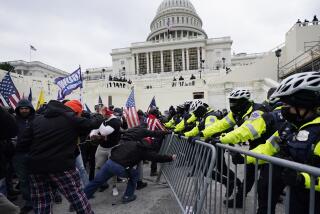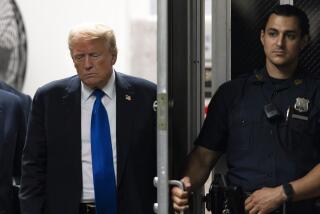GOP Charges Mainly Rest on Assumptions
- Share via
WASHINGTON — It is still all about lying about sex.
One year ago this week, President Clinton called Monica S. Lewinsky after midnight to say that Paula Corbin Jones’ lawyers had put her on their witness list. The two agreed that the former intern could escape testifying if she filed a sworn statement denying that they had a “sexual relationship.”
She did so. And that half-truth, half-lie set in motion the legal and political tumult that likely will result in the president’s impeachment Saturday.
It will then be left to the Senate to decide whether Clinton gave “willfully perjurious” testimony to conceal his affair with Lewinsky and, if so, whether it justifies removing him from office.
However, Lewinsky’s simple sworn statement also illustrates a weakness at the heart of the impeachment case, one that has been obscured by the hardening political rhetoric. To a surprising degree, the Republicans’ charges--which in three of the four impeachment articles boil down to lying under oath--rest on assertions and assumptions, not facts and evidence.
Lewinsky’s “filing of a false affidavit” triggered the whole case, the Judiciary Committee’s Republican majority says in its final report. Her statement also forms a key part of impeachment Article III, which says that Clinton obstructed justice in trying to conceal his relationship with Lewinsky.
“On or about December 17, 1997,” it says, “William Jefferson Clinton corruptly encouraged a witness . . . to execute a sworn affidavit . . . he knew to be perjurious, false and misleading.”
Common sense shows that Clinton intended to lie and obstruct justice, the Republicans say.
But Clinton and Lewinsky have said that they thought their statements essentially were true. The president said that a sexual relationship means a couple is “sleeping together.” Lewinsky said she thought theirs was less than a sexual relationship because they just “fooled around.”
Certainly Clinton’s well-deserved reputation for cutting corners and giving evasive answers has put him in the deep political trouble he now faces. To House Republicans and to many Americans as well, he has become the political equivalent of Joe Isuzu, the famous car salesman of the 1980s ad campaign who hawked his product while the words “He’s lying” flashed across the TV screen.
High Standard for Proving Perjury
But as a legal matter, perjury goes well beyond evasiveness and, indeed, a witness’ half-true statements can serve as a strong defense.
The Supreme Court has set a high standard for proving perjury: evidence that a witness under oath made a significant statement which was clearly false and that he did so with an intent to lie. Common sense assumptions about what the witness may have thought are not good enough.
If the witness thought his statement was true, it is not perjury, the court has said. Even the “wily witness” who gives “intentionally misleading responses” cannot be charged with perjury, the justices have said. A perjury conviction requires evidence of a demonstrably false statement.
And while legal precedent is unlikely to dissuade a majority of House members from voting to impeach Clinton, it could influence the outcome of a Senate trial--and whether an impeached Clinton ultimately would be removed from office.
Article I of the impeachment resolution against Clinton says that he gave “willfully provided perjurious” answers to the federal grand jury on Aug. 17 “concerning the nature and details of his relationship” with Lewinsky. Article II says that he made “willfully perjurious” statements concerning Lewinsky in his Jones deposition on Jan. 17. Article IV says that he “made perjurious statements” in November when his lawyers gave terse, written responses to the Judiciary Committee’s 81 questions.
During last week’s committee debate, the Republicans refused to say which of Clinton’s statements were perjurious. The 263-page final report released by the Republicans Wednesday offers little more in the way of specific evidence.
When Clinton was asked under oath in August about Lewinsky, for example, he admitted that he had had “inappropriate intimate contact” with her on several occasions in 1996 and 1997. He refused to give details of their sexual encounters.
The report recites this exchange and concludes that Clinton’s testimony was “perjurious.”
“The fact that he provided to the grand jury a half-true, incomplete and misleading statement as a true and complete characterization” shows that he committed perjury, it says.
Anti-Clinton Charges Focus on Assumptions
Similarly, the committee Republicans also maintain that Clinton committed perjury when he said he believed the definition of “sexual relations” used in the Jones case did not include oral sex. It “defies common sense and human experience” to believe he thought that, their report says.
Other examples abound in which the charges depend on assertions or assumptions.
The Republicans accuse Clinton of perjury for denying that he asked his secretary, Betty Currie, to retrieve his gifts to Lewinsky on Dec. 28. Yet, both Lewinsky and Currie testified that Clinton did not make such a request. The Republicans assume that he did.
Clinton also is accused of obstructing justice by “coaching” a witness--Currie--on Jan. 18, the day after his Jones deposition. This charge assumes that the president thought Currie would be a witness. But she had not been called as a witness in the Jones case, and neither of them knew independent counsel Kenneth W. Starr would soon begin a criminal investigation. Clinton said that he was worried about an embarrassing barrage of news stories, not a criminal inquiry.
The strongest evidence for perjury concerns the president’s evasive answers to questions posed during the Jan. 17 deposition. Asked whether he was ever alone with Lewinsky, Clinton gave a wandering answer, including “I have no specific recollection.” That reply looks to be demonstrably false.
All along, however, the Republicans have said that Clinton’s grand jury testimony is the key. On one crucial point, two witnesses gave clearly conflicting testimony. Clinton denied he had touched Lewinsky in a sexual way. She said he did.
Thomas-Hill Case Offers Parallels
In a court of law, such a direct contradiction would rarely result in a perjury charge because no independent evidence could prove who is lying.
The nation saw just such a conflict in October 1991. Under oath and on national television, law professor Anita Faye Hill gave a detailed account of a series of crude statements that she says were made by her boss, Clarence Thomas.
Then the Supreme Court nominee was sworn in to testify before the Senate Judiciary Committee, and he “categorically denied” Hill’s accusations. Several Republican senators came to his defense and suggested that Hill had imagined her account. Sen. Orrin G. Hatch (R-Utah) read passages of a novel and said that Hill may have gotten her ideas there.
No one suggested then that the rule of law demanded a perjury prosecution. One of the two must have lied under oath, but no first-hand witness could say for sure who it was.
(BEGIN TEXT OF INFOBOX / INFOGRAPHIC)
The Impeachment Articles
Key details of the four articles of impeachment against President Clinton to be voted on by the House:
Article I alleges that the president committed perjury before independent counsel Kenneth W. Starr’s grand jury on Aug. 17 when he:
* “Willfully provided perjurious, false and misleading testimony” about the nature and details of his relationship with Monica S. Lewinsky.
* Lied regarding his prior false testimony in the Paula Corbin Jones sexual harassment lawsuit.
* Lied about allowing his attorney, Robert S. Bennett, to introduce false information in the Jones case.
* Lied about his “corrupt efforts to influence the testimony of witnesses” and to impede evidence gathering in the Jones case.
****
Article II alleges that Clinton:
* “Provided perjurious, false and misleading testimony” in written answers on Dec. 23, 1997, and during his videotaped testimony on Jan. 17, 1998.
* “Willfully corrupted and manipulated the judicial process of the United States for his personal gain and exoneration” in the Jones sexual harassment lawsuit.
* Impeded “the administration of justice.”
****
Article III contends that Clinton:
* “Prevented, obstructed and impeded the administration of justice and . . . engaged personally and through his subordinates and agents . . . to delay, impede, cover up and conceal the existence” of evidence and testimony related to the Jones case.
* Committed seven acts of obstruction, including “an effort to secure job assistance” for Lewinsky.
****
Article IV alleges that Clinton:
* Was guilty of “misuse and abuse” of his presidential office when he “refused and failed to respond to certain requests for admission and willfully made perjurious, false and misleading sworn statements” during the House impeachment inquiry.
Source: Associated Press
More to Read
Get the L.A. Times Politics newsletter
Deeply reported insights into legislation, politics and policy from Sacramento, Washington and beyond. In your inbox twice per week.
You may occasionally receive promotional content from the Los Angeles Times.











